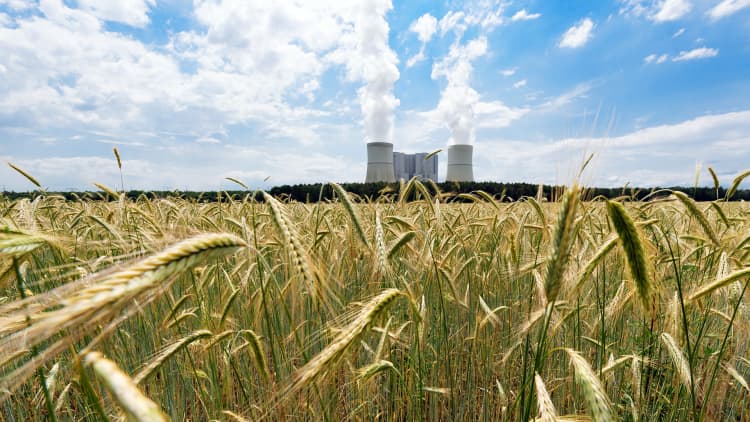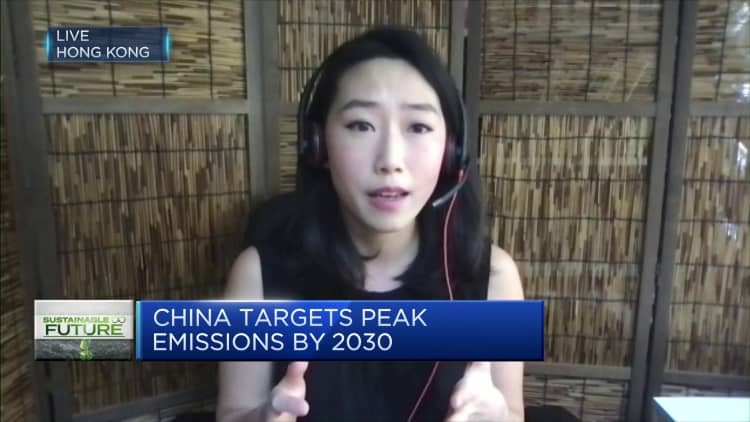
China's climate push could spawn new global players, even if Beijing falls short on its pledge
BEIJING — China says it wants to be carbon neutral by 2060 — and those stated ambitions are spawning companies that could one day become global leaders in their fields.
Two years ago, Chinese President Xi Jinping formally announced the world's second largest economy would strive for peak carbon emissions in 2030, and carbon neutrality in 2060.
To be carbon neutral means the amount of carbon dioxide emitted by the whole country will be offset in other ways. It also means there shouldn't?/won't? be any increase in greenhouse emissions in China after 2030.
While the country struggles to wean itself off coal, analysts said Beijing's top-level emphasis on climate has fueled a policy push to try to support businesses focused on renewable energy and reducing carbon emissions.
"China's already a leader in so many parts of the decarbonization effort," said Norman Waite, energy finance analyst at the Institute for Energy Economics and Financial Analysis (IEEFA).
"They're either leading or right in the pack with everybody else in the efforts to decarbonize. It's not a one- or two-company effort. This is a bunch of companies who are pressing forward," he said.
Overseas expansion
Electric cars and batteries have been an obvious growth area, with Chinese EV makers expanding their businesses beyond China.
Chinese electric car giant and battery maker BYD launched passenger cars for Europe in late September, while start-up Nio is set to hold its European launch event in Berlin in early October.
Technologies to store and transmit power generated via renewable sources are another area that analysts are watching.

"More of the Chinese companies are getting to the size in China that they start to go out as well and establish partnerships abroad" in energy storage, said Johan Annell, partner at Asia Perspective, a consulting firm that works primarily with Northern European companies operating in East and Southeast Asia.
In energy efficiency, equipment for heating and cooling, Annell said, "you're also getting a lot of Chinese companies going out and starting to win business, particularly in the countries surrounding China" — such as Mongolia and Kazakhstan.
Emerging leader in offshore wind?
The offshore wind sector is another field that could see an emerging Chinese leader.
Offshore wind is a renewable energy that uses turbines in coastal waters — many of which can be installed near the world's largest urban centers, IEEFA's Waite said in a September report.
China's leaders also recognize that, in the long term, China's development will not be economically sustainable – and hence politically and socially sustainable – until it is also environmentally so.Cory CombsTrivium China
Mingyang Smart Energy, already a leader in offshore wind power in China, "appears poised to disrupt international, non-Chinese markets at a vulnerable time for established competitors," Waite said. He noted the company can tackle overseas markets with its strong balance sheet, large production capacity and potentially aggressive pricing power.
The industry's three global players — Siemens Gamesa Renewable Energy, Denmark's Vestas Wind System and General Electric — "are racking up losses, and only Vestas is doing so without the further stress of an imminent restructuring," he said.
Vestas said it doesn't comment on its competitors, and the two other companies did not respond to CNBC's request for comment.

In December, Mingyang signed a memorandum of understanding to build a factory in the U.K. and explore options for entering the local British market.
The company's other projects or contracts include partners in Italy, Japan and Vietnam, Waite said.
The U.K. and the rest of Europe are each expected to add about 10 gigawatts of offshore wind power in the next three years, according to IEEFA Research.
In the following five years, that capacity is set to triple in the U.K., and increase by five-fold in the European mainland to about 60 gigawatts, the report said.
'New infrastructure investment'
For Chinese companies, aligning with the country's carbon neutrality theme fits well with Beijing's other directives — for improving innovation, moving into higher-end industrial manufacturing and boosting non-traditional infrastructure investment, said Bruce Pang, chief economist and head of research for Greater China at JLL.
"If you are a rational agency of the local government, your actions under the rationale will be focused [on projects] under the name of new infrastructure investment," he said.
National security is another factor driving China's focus on developing energy sources.
"Energy security is given more of a priority because of the economic challenges and the socioeconomic challenges," said Seungjoo Ro, CLSA's head of ESG research, sustainability and corporate governance research.
Ro pointed out that there are still 38 years to go in China's carbon neutral roadmap, and it's still not entirely clear how investors can measure potential share price returns based solely on climate-related measures right now.
Not an easy road ahead
In practice, some $22 trillion are required to achieve China's ambitious carbon goals, according to a report from the World Economic Forum and Oliver Wyman.
"To achieve its ambitious carbon peak and carbon neutrality goals, China needs to close an annual funding gap of about RMB1.1 trillion ($170 billion)," the summer report pointed out. "It can only do so if it manages to develop far more sophisticated green financing schemes."
And if Chinese companies want to play a role in global efforts to reach environment goals, some differences between local standards need to be resolved with international ones, said Kelly Tian, financial services-focused principal at Oliver Wyman.
The last two years show how Chinese leaders still struggle to balance growth and economic interests with achieving climate goals, especially in an economy where coal is the dominant energy source.
Overenthusiastic measures to force local areas to cut carbon emissions last year resulted in a power shortage that disrupted factory production.

China ended up adding coal production capacity this year, helping the country stave off similar power shortages, despite extreme dry and hot weather in parts of the country, said Cory Combs, associate director at research and consulting firm Trivium China, in a September report published by Asia Society Policy Institute.
Even if the carbon directives come from the top leadership, Combs said there's still tension between short-term and longer-term economic interests that will likely last through the coming decade.
Reducing that tension will help China reduce carbon emissions, he said. "But China's leaders also recognize that, in the long term, China's development will not be economically sustainable – and hence politically and socially sustainable – until it is also environmentally so."
China's state-run media has promoted environmental improvements across the country. And after years of some of the worst air pollution in the world, conditions in Beijing have improved so much in the last year that locals can frequently see far-off mountains and stars from the center of the city.






